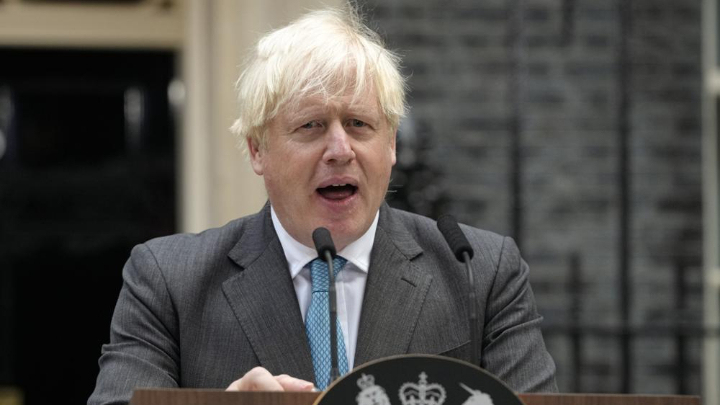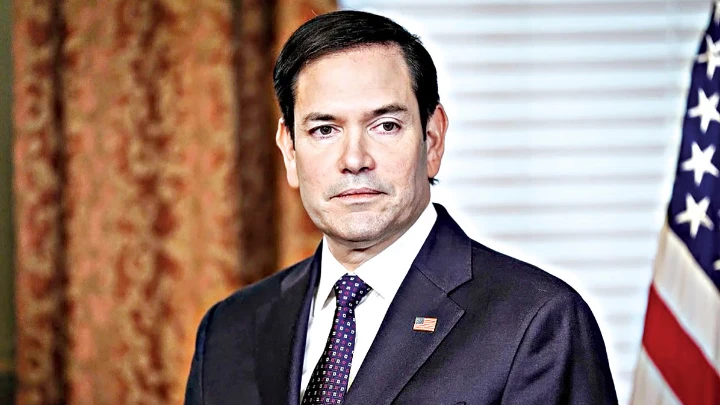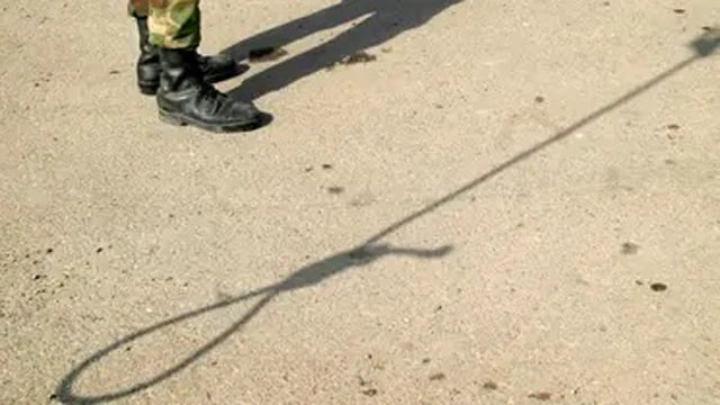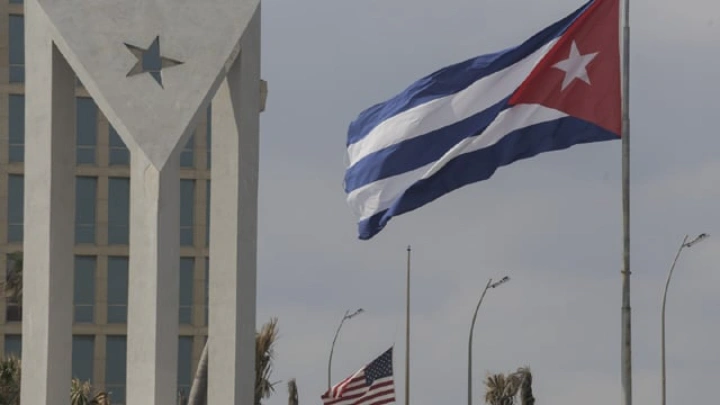Johnson leaves Downing Street to offer resignation to queen
Shining BD Desk || Shining BD
Prime Minister Boris Johnson left his Downing Street office for the last time on Tuesday before heading to Scotland to formally offer his resignation to Queen Elizabeth II.
The British leader, who announced his intention to step down two months ago, is expected to meet with the queen in the late morning at her Balmoral estate to begin the transfer of power to Liz Truss.
Truss, who was named leader of the ruling Conservative party on Monday, will be appointed prime minister during her own audience with the queen a short time later.
Speaking outside No. 10 Downing Street, Johnson said his policies had given the country the economic strength to help people weather the energy crisis before he signed off his typical bluster.
“I am like one of those booster rockets that has fulfilled its function,” Johnson said before getting into a car and leaving the gates of Downing Street for the last time as prime minister.. “I will now be gently re-entering the atmosphere and splashing down invisibly in some remote and obscure corner of the Pacific.’’
This is the first time the handover of power is taking place at Balmoral, the monarch’s summer retreat in Aberdeenshire, rather than at Buckingham Palace in London. The ceremony was moved to Scotland to provide certainty about the schedule because the 96-year-old queen has experienced problems getting around that have forced palace officials to make decisions about her travel on a day-to-day basis.
Truss, 47, takes office a day after the Conservative Party’s 172,000 members elected her to lead their party.
On Tuesday afternoon, she is expected to make her first speech as leader of a nation 67 million people anxious about soaring energy bills and a looming winter of recession and labor unrest. Those problems have festered for the past two months because Johnson had no authority to make major policy decisions after announcing his plan to step down.
Speaking to Conservative party members on Monday, Truss promised to “deliver” on the economy, the energy crisis and the overstretched health care system, though she offered few specifics on her policies. On Sunday, Truss promised to unveil her plans for tackling the cost-of-living crisis within a week.
Bronwen Maddox, director of the international affairs think tank Chatham House, said Truss will have to say “an awful lot more” to reach the wider electorate.
“Everything, every road, comes back to cost of living at this point,” Maddox said. “And if she delivers, to use her word on that, then you might see the mood getting much more positive.”
Many people in Britain are still learning about the woman who will soon be their leader.
Unlike Johnson, who made himself a media celebrity long before he became prime minister, Truss rose quietly through the Conservative ranks before she was named foreign secretary, one of the top Cabinet posts, just a year ago.
THIS IS A BREAKING NEWS UPDATE. AP’s earlier story follows below.
LONDON (AP) — Liz Truss has persuaded Britain’s Conservative Party to make her its leader. On Tuesday, she will become prime minister of the whole U.K. and must win over millions of people who don’t know her, but want her to help — fast.
A day after winning a leadership vote of the party’s 172,000 members, Truss will make her first speech as prime minister of a nation wracked with anxiety about skyrocketing energy bills and a looming winter of recession and labor unrest.
Speaking to Conservative members on Monday, Truss promised to “deliver” on the economy, the energy crisis and the overstretched health care system.
Bronwen Maddox, director of the international affairs think tank Chatham House, said that to reach the wider electorate, “she’s going to have to say an awful lot more,”
“Everything, every road, comes back to cost of living at this point,” Maddox said. “And if she delivers, to use her word on that, then you might see the mood getting much more positive.”
For most people in Britain, Truss is an unknown quantity. Unlike departing leader Boris Johnson, who made himself a media celebrity long before he became prime minister, Truss has risen quietly through Conservative ranks from junior lawmaker to foreign secretary, and now prime minister.
In a tightly choreographed constitutional changeover, Johnson will visit Queen Elizabeth II on Tuesday to tender his resignation as prime minister. Immediately afterwards, Truss will meet the queen, who will formally ask the new Tory leader to form a government.
The monarch’s role is central, but ceremonial — the queen has no political power. For the first time the handover is taking place at Balmoral, the monarch’s summer retreat in Scotland, rather than at Buckingham Palace in London. The 96-year-old queen has experienced mobility problems that have restricted her travel and public duties.
After flying back to London, Truss will enter Downing Street as prime minister and make a televised address. Such speeches are a chance for new leaders to set out their vision — and can come back to haunt them. In his debut speech in 2019, Johnson vowed to “restore trust in our democracy.” He leaves tarnished by multiple scandals that have increased public cynicism about politicians.
Truss is under pressure to spell out how she plans to help people and businesses struggling to pay energy bills that are due to rise next month to 3,500 pounds ($4,000) for the average household – triple the cost of a year ago.
During the leadership campaign, she promised help for people struggling to pay their bills, but declined to say what form the support would take.
The price spike, driven by Russia’s invasion of Ukraine and the aftershocks of COVID-19 and Brexit, has propelled U.K. inflation above 10% for the first time in four decades. The Bank of England forecasts it will hit 13.3% in October, and that the U.K. will tip into recession by the end of the year.
Train drivers, port staff, garbage collectors, postal workers and lawyers have all staged strikes to demand that pay increases keep pace with inflation, and millions more, from teachers to nurses, could walk out in the next few months.
Truss, a low-tax, small-government conservative, says her priority is cutting taxes and slashing regulations to fuel economic growth. Critics say that will further fuel inflation while failing to address the cost-of-living crisis. The uncertainty has rattled money markets, driving the pound as low as $1.15, its weakest performance against the dollar since the 1980s.
The first task for Truss will be to appoint a Cabinet to tackle the government’s mountain of challenges.
Kwasi Kwarteng, who was business secretary in Johnson’s government, is favorite to be named to the key job of Treasury chief. Like Truss, Kwarteng is a free-marketeer in the mold of 1980s Conservative Prime Minister Margaret Thatcher. But the scale of the economic crisis may mean he and Truss have to quash their small-state instincts and spend billions to help people pay their bills.
Writing in the Financial Times on Monday, Kwarteng said a Truss government would “take immediate action … to get families and businesses through this winter and the next.” He, too, did not supply any details.
In theory, Truss has time to make her mark: She does not have to call a national election until 2024. But opinion polls already give the main opposition Labour Party a steady lead, and the worse the economy gets, the more pressure will grow.
Truss and her new Cabinet also face multiple foreign policy crises, including the war in Ukraine and frosty post-Brexit relations with the European Union.
As foreign secretary Truss was a firm supporter of Ukraine’s resistance to Russian invasion, and as prime minister she will continue the U.K.’s civilian and military support for Kyiv. She has said her first phone call with a world leader will be to President Volodymyr Zelenskyy. She has also pledged to boost U.K. defense spending from just over 2% to 3% of gross domestic product — another expensive promise.
She’s likely to have much cooler conversations with EU leaders, who have been annoyed by Truss’s uncompromising stance as foreign secretary in talks over trade rules for Northern Ireland, an unresolved Brexit issue that has soured relations between London and Brussels. With the U.K. threatening to breach the legally binding divorce treaty, and the EU launching legal action in return, the dispute could escalate into a trade war between the U.K. and the 27-nation bloc.
Irish Foreign Minister Simon Coveney expressed hope that, once in power, Truss will adopt a more moderate approach.
“A lot of the key decision makers are trying to reach out and give a signal to Liz Truss that if she decides to change course to a more positive one in terms of trying to find a sensible compromise with the EU, that we can find a way forward on this issue,” he said.
By AP
Shining BD






















